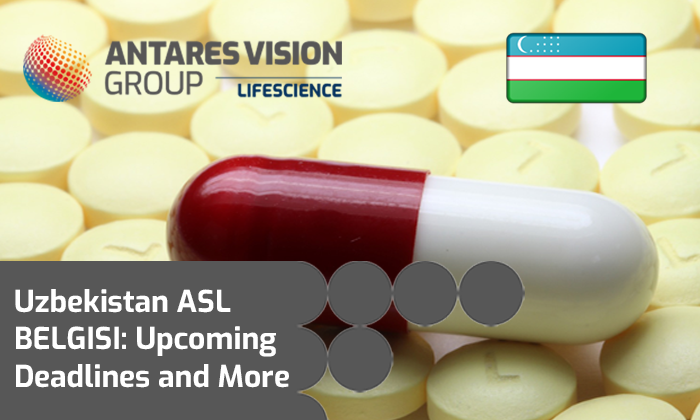Note about Uzbekistan traceability: On February 7, 2022 — just 10 days after we posted this article — Uzbekistan’s State Tax Committee announced that it was “extending the timeframe for the phased introduction of mandatory digital markings” for pharmaceutical products. The February 1 deadline is longer in effect for this product category. Read the details here.
On February 1, 2022, Uzbekistan traceability requirements for medicines and medical devices will go into effect. It’s the latest compliance deadline in the country’s push for serialization and digital marking regulations that will affect an array of industries. Here’s a breakdown of the law and the latest Uzbekistan traceability updates.
The Uzbekistan Traceability System: ASL BELGISI
The Uzbekistan traceability system is called ASL BELGISI. It’s managed by CRPT Turon, the equivalent of Russia’s Center for Research in Perspective Technologies (CRPT), which manages Russia’s National Track and Trace Digital System (Chestny ZNAK).
On November 20, 2020, the Uzbekistan government published Decree PKM-737, “Establishment of Obligatory Digital Labeling.” It mandates serialization for tobacco products; alcohol, including wine and wine products; beer and brewing products; appliances; medicines and medical devices; and water and soft drinks.
Furthermore, it requires supply chain participants to register with a national catalog of labeled goods; when an application is approved, the participant receives an account and is granted access to the system.
According to the CRPT Turon website, the “main task” of ASL BELGISI “is to guarantee consumers the authenticity and declared quality of the purchased products.” Like Chestny ZNAK, consumers can download a mobile app to scan products, report suspect products, and provide feedback about the system.
Marking requirements
Uzbekistan traceability requirements mirror those mandated in Chestny ZNAK. All domestically produced and imported goods must be marked with DataMatrix codes that are traced across the supply chain through a four-step process:
-
- CPRT Turon assigns a unique DataMatrix code to each product and the manufacturer or importer places it on the packaging.
- The product’s movements are traced throughout the supply chain, from the factory or point of importation to the consumer, via scanning of the DataMatrix code.
- Retailers scan the codes when products are stocked and sold.
- Consumers can use the ASL BELGISI app to check a product’s legitimacy (i.e., confirm that it’s not a counterfeit) and access product information.
To get DataMatrix codes, participants must be registered with ASL BELGISI, describe the goods in a national catalog of labeled goods, then formally order the codes and apply them to the products. The codes must be applied to packaging or a product label according to the ISO/IEC 16022-2008 “Automatic identification and data capture techniques – Data Matrix bar code symbology” specification. At present, each DataMatrix code costs 68 som (excluding VAT), which is quite literally a fraction of a U.S. dollar: $0.0063.
Like its Russian counterpart, ASL BELGISI uses “verification keys” and “verification codes.” These are also commonly known as crypto codes. CRPT Turon generates these codes.
Generally, the DataMatrix codes for products in every regulated industry must include four data points:
-
- A 14-digit product code (i.e., Global Trade Item Number, or GTIN)
- A 13-character randomized serial number generated by CRPT Turon or a supply chain participant
- A four-character verification key generated by CRPT Turon
- A 44-character verification code generated by CRPT Turon
For aggregation, a Serial Shipping Container Code (SSCC) number must be provided in a one-dimensional barcode following the ISO 15394:2009 “Packaging – Barcode and two-dimensional symbols for shipping, transport and receiving labels” specification.
Regulated industries and key dates/requirements
Uzbekistan traceability regulations currently apply to five product categories: tobacco; alcohol, including wine and wine products; beer and brewing products; appliances; medicines and medical devices; and water and soft drinks. Below, we list the latest information about each category.
Filter cigarettes
-
- January 1, 2021: only labeled products may be produced and imported
- July 1, 2021: manufacturers may ship only labeled products to wholesalers
- October 1, 2021: distributors may ship only labeled products to retailers
- January 1, 2022: sale of unmarked cigarettes is prohibited
- October 1, 2022: mandatory labeling for all types of tobacco products
Alcohol
-
- January 1, 2021: only labeled products, including wine and wine products, may be produced and imported
- December 1, 2021: alcoholic beverages packaged in metal containers, including aluminum containers, must be labeled
- December 1, 2021: aggregation required for alcoholic beverages, including wine and wine products
- November 1, 2022: aggregation required for alcoholic beverages packaged in metal containers, including aluminum containers
Beer and brewing products
Mandatory labeling began on April 1, 2021.
Appliances
A pilot for appliances began on July 1, 2021. Mandatory labeling is being introduced in phases. Vacuum cleaners, refrigerators, freezers, washing machines, TVs, and monitors were required to be labeled beginning December 1, 2021.
Medicines and medical devices
-
- June 1, 2021: 6-month pilot for medicines and medical devices begins
- January 28, 2022: CRPT Turon announces that the pilot is officially closed
- February 1, 2022: only labeled products may be produced and imported
CRPT Turon reported that, during the pilot, all participants successfully registered with ASL BELGISI and registered agreed-upon product in the national catalog of labeled goods. They also successfully installed marking equipment on production lines, trained employees to use the equipment, and released batches of properly labeled, serialized products.
More about the requirements for medicines and medical devices
In addition to a DataMatrix code that includes a 14-digit product code (i.e., GTIN), a 13-character randomized serial number, a 4-character verification key, and a 44-character verification code, packaging must have a human-readable GTIN, lot number, expiration date, manufacturing date, and serial number.
Digital marking must be applied directly to packaging on the production line in a “specially designated place” and not be larger than 10×10 millimeters. The codes must be affixed in a way that prevents them from being separated from packaging during the entire shelf life of the product. Codes may not be printed on external packaging material, including transparent film/wraps, and my not be obscured by other information.
Water and soft drinks
This product category includes bottled water, soft drinks, and fruit and vegetable juices.
-
- June 1, 2021: pilot for water and soft drinks begins
- March 1, 2022: only labeled products may be produced and imported
Final thoughts
In June 2021, CRPT Turon announced that it had issued more than 350 million codes, including more than 200 million for tobacco products, almost 130 million for alcohol products, and approximately 20 million for beer products.
As of today (January 28, 2022), it reports that it has issued nearly 583 million codes for tobacco products, more than 300 million for alcohol products, almost 143 million for beer products.
These figures illustrate a simple fact: Strict serialization and traceability regulations are here to stay in Uzbekistan. Russia has led the way with Chestny ZNAK, which arguably has the world’s toughest supply chain requirements, and we should watch the regulatory landscape in the other Newly Independent States (NIS) — Armenia, Azerbaijan, Belarus, Georgia, Kazakhstan, Kyrgyzstan, Moldova, Tajikistan, Turkmenistan, and Ukraine.
As we said above, ASL BELGISI, the Uzbekistan traceability system, mirrors Russia’s Chestny ZNAK. rfxcel is an undisputed leader in Chestny ZNAK compliance. Consider these facts:
- We’re an official CRPT partner for medications, bottled drinking water, tobacco, footwear, tires, light industry, perfumes, dairy, bicycles, and wheelchairs.
- We’ve demonstrated to the CRPT that our solutions for traceability and compliance meet its stringent requirements.
- We’re accredited as an IT company by Russia’s Ministry of Digital Development, Communications, and Mass Media.
- We’re one of the few providers with active implementations in Russia (e.g., major global consumer goods and pharmaceutical companies).
- We have an ever-growing Moscow-based team that knows the regulations and brings expertise in key areas of supply chain management and technology.
- We’ve led the way in thought leadership with white papers and industry updates and information. (See the list below for a sample.)
We’ve also developed end-to-end traceability and compliance hubs for governments that want to lock down their supply chains with the best digital technologies and solutions. Read more about those here and here.
Contact us today to learn more about our traceability and compliance solutions. Our digital supply chain experts will share a short demo of our award-winning Traceability System and show you how to remain compliant and agile no matter where you do business.
A sample of our Chestny ZNAK coverage:
- Requirements for Russia’s Textile and Apparel Supply Chain
- Mandatory Dairy Product Labeling in Russia to Begin in Two Months
- Russia Chestny ZNAK Bottled Drinking Water Pilot Ending Soon
- What Does It Mean to Be a CRPT Partner in Russia’s Supply Chain?
- New Russian Serialization Pilot for Biologically Active Food Additives
- Russia Pharma Serialization Update: “Notification Mode” Expedites Product Circulation
- Russia Serialization Pilot to Combat Counterfeit Beer Set to Begin This Spring
- Russia Dairy Serialization Update: Mandatory Labeling for Cheese and Ice Cream





